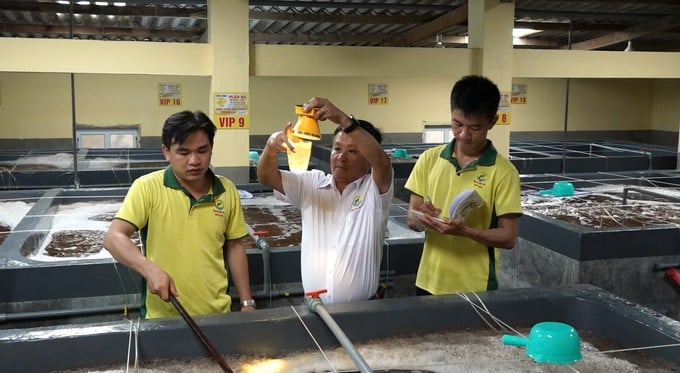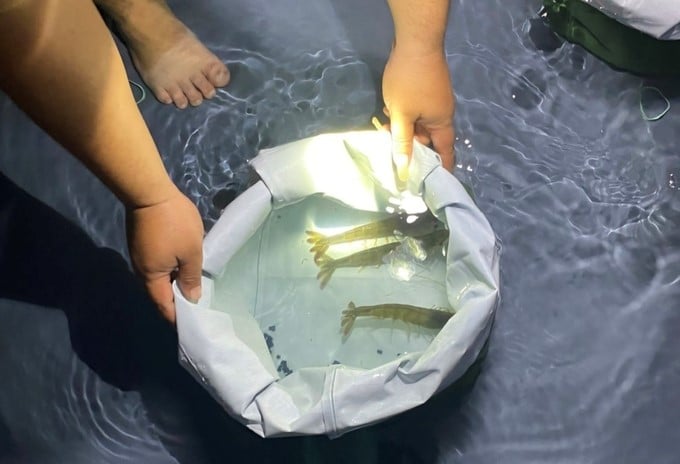November 19, 2025 | 23:40 GMT +7
November 19, 2025 | 23:40 GMT +7
Hotline: 0913.378.918
November 19, 2025 | 23:40 GMT +7
Hotline: 0913.378.918

Ninh Thuan's shrimp seed production industry is developing strongly. Photo: PC.
To realize the goal of developing the province into the country's high-quality shrimp seed production center, the Ninh Thuan Provincial People's Committee has decided to approve the Construction Zonning Plan at 1:2000 scale for the An Hai high-tech aquatic seed production area and Son Hai high-tech parent shrimp production area in the 2021-2030 period.
At the same time, the province also established a high-tech seed production area, assessing the natural status and applying high technology to develop aquatic seed production. Especially, the shrimp seeds meet the standards of the World Organization for Animal Health (OIE/WOAH) to develop Ninh Thuan into the country's high-quality shrimp seed production center. The production area will be invested in technical infrastructure, wastewater treatment areas, and green tree strips to isolate and avoid affecting the landscape of surrounding urban transport projects.
Mr. Huynh Minh Khanh, Deputy Director of the Ninh Thuan Sub-Department of Animal Husbandry and Veterinary Medicine, said that the early inclusion of these planning areas will meet the project premise, contributing to helping Ninh Thuan maintain its brand and continue to develop into the country's high-quality shrimp seed production center in the 2021-2030 period as required.
Accordingly, Ninh Thuan has focused on directing and strictly managing, especially the output of shrimp seed products. In particular, control the quality of imported parent seeds to meet standards, avoiding the case of using parent seeds for a long time, which reduces the quality of shrimp seeds.
Besides, the province also has geographical indications and protection of shrimp seed facilities that register trademarks. At the same time, strictly control output when exporting to other localities to avoid the case of poor-quality seeds affecting the quality of shrimp seeds in the province.

Most of the parent shrimp seeds are currently imported from abroad. Photo: PC.
Currently, Ninh Thuan is also replanning the areas of these two breed centers to control emissions and pollution between farms. Invest in wastewater treatment and environmental treatment infrastructure to avoid the situation of disease-infected farms discharging waste into the environment, which affects other farms and the current quality of shrimp seeds in the province.
Mr. Le Van Que, Chairman of the Ninh Thuan Aquatic Breed Association, said that building new centralized planning areas will meet environmental conditions and isolate the shrimp seed production area from other sectors.
“With methodical planning, new business owners will boldly renovate and invest in infrastructure, and this will break down the fragmentation of small farms. I hope that, in the near future, with the determination of leaders of the agricultural sector and the province, two planning areas for centralized shrimp seed production will soon be deployed. Particularly, I would like to emphasize the centralized area for domestication, selection, and genetic inheritance of parent shrimp in Son Hai," said Mr. Le Van Que.
According to Mr. Le Van Que, the shrimp seed production industry is still dependent on parent shrimp from abroad, leading to very high costs and risks for importing businesses. Many shipments infected with dangerous diseases have to be destroyed, so this is one of the factors that limits the development of shrimp seed production.
Therefore, Mr. Que believes that it is necessary to deploy synchronous solutions, such as calling on corporations that own genetic resources of parent shrimp from the world to come to Ninh Thuan. In addition, boldly advocate and force businesses that wish to invest in producing shrimp seeds or other aquatic species to enter the planning area.
Besides, Ninh Thuan province must take advantage of funding sources from socialization and the Central Government to build infrastructure such as input water, wastewater, an executive board, etc. in order to control the quality of shrimp seeds and prevent diseases from spreading outside.
Translated by Thu Huyen

(VAN) The agricultural sector agreed on a roadmap to pilot the MRV protocol and expand low-emission rice production from the 2025-2026 winter-spring crop.

(VAN) Agricultural extension officers in Quang Ninh do more than transmit knowledge; they have become a steadfast support system for farmers on the path to sustainable agricultural development.

(VAN) The development of a high-quality beef cattle herd has brought major benefits to livestock farmers, creating jobs and enabling better use of agricultural by-products.

(VAN) In the eastern region of Gia Lai, crossbred cattle now account for 93%, forming a high-quality beef herd and establishing a recognized brand, the result of 35 years of persistent effort.

(VAN) Integrating agricultural extension activities with ecotourism development unlocks promising new avenues for localities boasting specific advantages in grape and apple cultivation.

(VAN) Enterprises and cooperatives accompany farmers in Tay Ninh to develop an organic seedless lime growing area, paving the way for poverty reduction.

(VAN) There were times when Pho faltered, yet his aspiration to bring the pure aroma to those who truly value clean tea kept urging him forward.